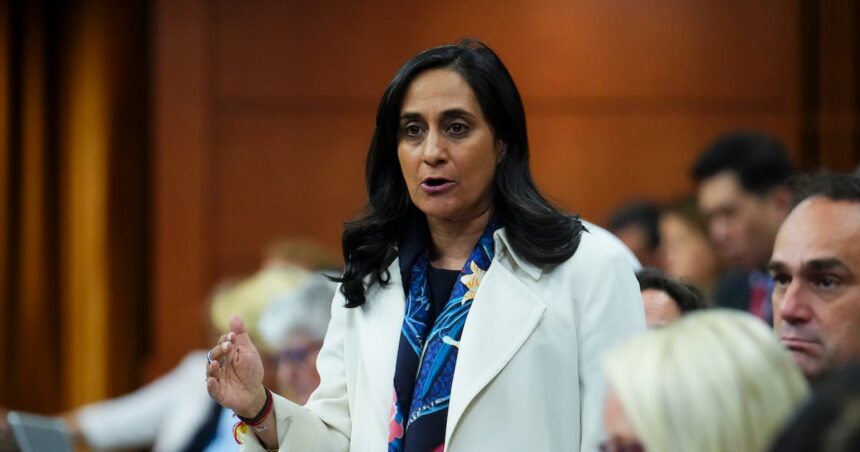I arrived in Tel Aviv three days before the missile struck. The Mediterranean air carried an edge of tension that veteran correspondents recognize – a city holding its collective breath. Now I’m watching Israeli emergency teams extract survivors from what used to be a 12-story apartment building less than a kilometer from where Canada maintains diplomatic offices.
Among those pulled from the rubble yesterday was Julian Marceau, a 38-year-old Canadian embassy worker who had been inside visiting a colleague when the missile hit. Defence Minister Anita Anand confirmed the rescue operation early this morning, calling it “a moment of relief amid ongoing tragedy.”
“We can confirm that Mr. Marceau is receiving medical treatment and is in stable condition,” Anand told reporters during an emergency briefing. “Our diplomatic personnel remain at heightened alert as we continue to monitor the situation.”
The missile strike, which killed seven people and injured dozens more, represents the deepest penetration of Tel Aviv’s air defenses in months. Israeli military officials claim the projectile was launched from Lebanon, though Hezbollah has neither confirmed nor denied responsibility.
“The apartment literally split in half,” recounted Dov Eilon, a Tel Aviv emergency responder who participated in the rescue. “We heard voices from inside what remained of the third floor. The Canadian was trapped under a collapsed wall, but conscious and able to direct us to his location.”
This incident occurs against a backdrop of escalating regional tensions. The International Crisis Group documented 43 cross-border exchanges in the past week alone, a 180% increase from the monthly average earlier this year. United Nations peacekeeping forces stationed along the Israel-Lebanon border report “unprecedented levels” of military activity.
Standing at the cordoned-off perimeter, I spoke with Yael Baruch, whose apartment building faces the struck complex. “We heard the air raid sirens and had maybe 90 seconds to reach the shelter,” she explained, her hands still trembling hours after the impact. “There was a sound like the world breaking open, then glass everywhere.”
Canadian diplomatic presence in Israel has been operating under enhanced security protocols since April, according to Global Affairs Canada. Sources within the department, speaking on condition of anonymity, indicate approximately 28 Canadian diplomatic staff remain in-country, with contingency evacuation plans continuously updated.
The rescue effort itself involved a delicate coordination between Israeli Defense Forces, emergency services, and Canadian security personnel. “We maintained direct communication with our counterparts throughout the operation,” confirmed Colonel Aviv Kochavi of the IDF Home Front Command. “Every minute counted.”
For Marceau, who joined the Canadian diplomatic corps five years ago after service with humanitarian organizations in Jordan and Egypt, survival came down to luck and location. Engineers at the scene note that he was protected by a structural support beam that created a void space when the building partially collapsed.
Canadian Prime Minister Justin Trudeau addressed the incident during scheduled remarks at a G7 meeting in Italy, calling for “immediate de-escalation” and offering “Canada’s unwavering support for peaceful resolution.” However, regional analysts express skepticism about diplomatic solutions in the current environment.
“What we’re seeing is the collapse of containment strategies that have kept this conflict from boiling over,” explains Dr. Nadia Habib of the Middle East Institute. “When diplomatic facilities and personnel become targets – even unintentionally – it represents a dangerous new phase.”
Global Affairs Canada has updated travel advisories for the region, now warning against all travel to Israel and recommending Canadians currently in the country consider leaving if safe to do so. Commercial flights continue operating from Ben Gurion Airport, though with frequent disruptions during security incidents.
The UNRWA estimates over 14,000 people have been displaced within Israel due to border area evacuations and infrastructure damage in the past month. Economic impacts are equally severe, with the Tel Aviv Stock Exchange recording its steepest single-day decline in three years following yesterday’s strike.
For the wounded Canadian embassy worker, recovery will happen far from the conflict zone. Medical evacuation plans are underway to transport Marceau to a military hospital in Germany before eventual return to Canada. His family has requested privacy during this period.
As night falls over Tel Aviv, the rescue operation has transitioned to recovery mode. Search teams continue working under floodlights, their faces etched with exhaustion. In the distance, more sirens begin to wail.






